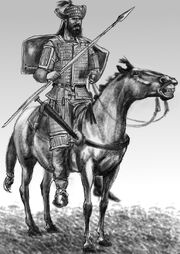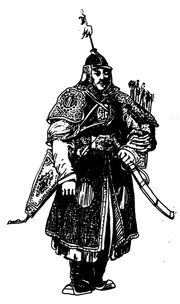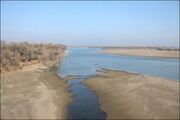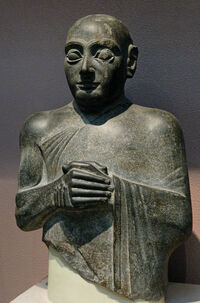|
| |
|
3rd Shahanshah of the Achaemenid Empire | |
| Predecessor | Cyrus the Great (after interregnum) |
| Successor | Xerxes I |
| Highest General | Bast |
|
High General of the Achaemenid Empire | |
|
Personal Lancer to Shahanshah | |
| Predecessor | Icreatus |
| Successor | Otanes |
| Born | Spring 550 BCPasargadae |
| Died | 4th June 486 BC (aged approximately 64) Palace of Ozymandias, Thebes, Egypt |
| Wife | Eshe |
| Royal House | House of Pasargad |
| Father | Hystaspes |
| Mother | Rhodogune |
| Issue | Crown Prince Xerxes
Maravid Hystaspes Iras 15 others |
| Religion | Zoroastrianism |
Darius I was the third ruler of the Achaemenid Empire. Also called Darius the Great, he expanded the empire at a great level, incorporating the remaining Massagetae tribes, Baluchistan, Thrace-Makedon, Coastal Sudan and Abyssinia and most importantly Egypt.
Darius is mentioned in the Bible several times, in Ezra, Nehemiah, Daniel, Haggai, and Zechariah.
Darius ascended the throne within a month of Cyrus the Great's death, according to the Behistun Inscription an imposter to the throne, Ashiphty, declared himself to be Cyrus' illegitimate son and ruled as a cruel dictator for a month before Darius overthrew him. Generally historians view this as propaganda, and instead Darius was the winner of a power struggle between the various nobles and generals of Cyrus (it is thought he was elected king by them). He soon met with rebellions and quelled them with his military savvy. The most famous events in his life were colonizing Egypt, a feat which not even the Babylonians had managed, and his mission to punish Athens and Sparta for supporting the Ionian Revolt. Although the war was unsuccessful overall, he did consolidate his power in Thrace-Makedon, Eretria and Lydia, and set the stages for the Persian colonization of Greece completed by his son Xerxes.
Darius divided the empire into satraps, placing nobles loyal to him and to Eranshahr in them to keep the subjects pleased. He introduced a new currency system and made Aramaic the official language of the empire. This infrastructure, although vastly changed by his son (the language was changed to Persian, the satraps were changed to elected bodies and the currency was made from a different material and renamed), did set the precedent for many empires to follow. Darius worked on great construction projects, relocating the capital city from Pasargadae to Parsa (the city of Yazada's monolith) and built magnificent palaces there and in Susa, Babylon, Thebes, Byblos, Memphis, Amarna and Jerusalem. He also continued to respect and fund the building of temples for the many religions in his empire (restoring the Byblos Temple to its former glory, increasing funding for the Temple of Solomon and setting the foundations for the Cycor City, the holy city of Hakorism). He also carved the Behistun Inscription, a log of his rule, which has great linguistic significance.

Flag of the Achaemenid Empire under Darius
Darius is most remembered for being the coldest and most brutal of the 'four great rulers' of Persia. He was much less like his predecessors' almost idealized descriptions of tolerance and even handedness, but much more human. He used bribery and blackmail to gain power, was brutal to his enemies and was prone to violent rages and outbursts at the slightest provocation. He was still very kind to his subjects who supported him and (toward those who did not break the law) was just as fair-handed as his

Map of the Empire under Darius, with the Delian League in Green
predecessors. He was purpotedly very self-concious, hence why his true appearance was lost for a long time until the pictured statue was discovered in one of the old sewer pipes in Parsa. His quote 'If we were to battle, I've already won' to the last emperor of Egypt before the battle of Byblos is well known throughout the world and is cited to show his brutal, arrogant nature.
Name []

Darius written in Old Persian Cuneiform
Darius is derived from the Latin Dārēus, which itself is derived from the Greek Dareîos (Δαρεῖος), the Greek form of the common Persian given name Dayahush (Ϫαyαϙuͽ), itself a shortened form of Darayavahush (Ϫαραyαvαϙuͽ).
It translates as 'Holding the good, firmly'. It is likely that Darius only used the
Darius written in Shapuri Script
Dayahush with close friends.
The modern form is Dayusha.
Early Life[]
Darius was born to Hystaspes and Rhodogune in the spring of 550 BC, as the eldest of five sons. His father was a respected member of the court of Cyrus, and his mother was a descendant of one of the many Parthians emancipated under Afrand. His early life is not documented, however it is known he served as a spearman for the Achaemenids. According to Herodotus he was involved in Gubaru's attempt to colonize Bahrain in 530 BC, and demonstrated such bravery in the battles against the Arabs that he became a member of Cyrus' elite guard, being promoted to Cyrus' personal lancer in 523 BC.
Role against Tomyris and the Scythians[]
The Massagetae (literally 'The Great Scythian Tribes'), the last great nomadic Scythian empire (the Scythians

al-Kufira, leader of the Turks
were eventually displaced by the Turkic peoples), had formed as a resistant movement to the Persians rapid advance. A loose confederation of nomadic tribes, lead by a council of 'Karahans' (the root word for 'Khan'), of which the leader was Queen Tomyris, had in its very brief existence (no more than three years), had conquered a huge amount of territory, Kazakhstan and Mongolia as well as parts of Russia fell prey to the pastoral nomads. They had began to raid Arianese lands and even captured Balkh, the holy city of Zoroastrianism. Cyrus had entrusted a former Spartan war leader, Icreatus, to defeating them, however he was killed in a disastrous attempt to retake Balkh. Cyrus' highest general, Pantea, had fallen severely ill and was unable to fight, and Gubaru had left to travel the world (visiting Ainu Japan, Australia and then South Africa, dying there). With the support of the Kingdom of Turkestan, a Turkic state who had been harassed by the Massagetae since its birth, Cyrus himself led an invasion on the confederation, taking with him the Turkestani High General, whom today is known for being revered in Islam as 'Abdul Tyran ibn al-Kufira' (his actual name was probably Kupiya), and his new personal lancer, Darius.
Originally Cyrus had planned to negotiate a treaty with the Massagetae, Darius even offered himself to marry the queen Tomyris. However Tomyris flatly rejected the idea. Instead Cyrus and al-Kufira launched an attack on Balkh, which was a resounding success. The Zoroastrian priests, whom had been locked away due to the Massagetae's staunch opposition to monotheism/henotheism and support of slavery, which is banned in Zoroastrianism, were freed and so were many of the Turkic and Arianese slaves of the Massagetae. Cyrus, at this point in his late seventies, still looked and fought like a healthy young man, described as 'not having a wisp of gray in beard nor hair, and not even a hint of fatigue or weakness during sword fights.' The writer from whom we know this from, Bealiah, himself a former Jewish slave freed by Cyrus in 559 BC, freed the Turk women who would become his wife. He writes:
'The Achaemenid troops of all types, Yemenite, Assyrian, Akkadian, Sumerian, Jewish, Greek, Persian, Parthian, Turks and Baluchis, marched through the streets, triumphantly singing and dancing. The populace were also partying, slaves ran to the soldiers who brought down their axes upon their chains, smashing them to bits and freeing them. My future wife crawled out of a burning building, a chain around her leg. The chain was attached to the wrist of a big Massagetae. In a time near death they would chain their slaves (who had to permanently wear chains anyway) to themselves, as to make sure their slaves are not freed or acquired by another after their death. Such barbarity angered Cyrus greatly, he grabbed one of the slave drivers and nearly stabbed him the face. Later he told me, 'It's not the way of the Achaemenid, not the way of the Zoroastrian, not the way of humankind.'
The capture of Balkh is also significant as it is the first time an atheist has been mentioned in history; when Cyrus (whom had brought many religious items for his soldiers such as menorahs, cult statues of Marduk etc.) called upon his soldiers to pray in the Great Temple of Zarathushtra, providing room for non-Zoroastrian soldiers, a Sumerian soldier called Ibbi approached Cyrus and stated;
'My liege, these statues of deities, this beautiful stupa, means nothing to me. I believe they hold no significance in my life, for they have failed to show themselves as their power would suggest.'
Cyrus responded, 'A belief in no god offends me as much as a belief in a different god, that being not at all. Go my boy, return to camp early.'
The battle was not without casualties. The majority of Massagetae soldiers, Turkic slaves, were slaughtered either fighting the Achaemenids or trying to surrender (when their commanders killed them before the Achaemenids could take them to a safer place). Of the 500 Zoroastrian priests, 140, including the Dastura Nakatar (the first Ethiopian Dastura), were burnt at the stake just hours before the battle. Perhaps most memorably, Darius lost his left eye while blocking Cyrus from an attack from a Massagetae soldier.

Turkic miniature of Darius standing behind a deer treading the bloody sand during the Battle for Samarkand
al-Kufira experienced his revelation of monotheism in Balkh, naming the god 'Tyran'. He is, along with Solomon and Jesus and others revered as a prophet of Allah (in Hadith but not the Qu'ran itself), and his name was Arabized to reflect this. He became an ascetic wanderer soon after, relinquishing command of the Turkestani army to Cyrus until he defeated the Massagetae.
Cyrus was ready to negotiate a further truce, however Darius, who believed that to safeguard Achaemenid territory the Massagetae had to be destroyed, convinced Cyrus that the best course of action was to take the Massagetae's largest city, Sunikapat (modern Samarkand). Darius drew up a very effective assault plan upon the city, and Cyrus was so impressed he promised to make Darius one of his generals should he be successful.
According to Bealiah, Darius' plan (which is unknown to this day) was so terrifyingly efficient the Massagetae holding the city surrendered within 40 minutes of fighting, with the Turkic slave soldiers killing any of their commanders who refused to surrender. Now general, Darius marched in the city triumphant, wearing unique Zhang dynasty armour, which he continued to wear for the rest of his life, with Cyrus following.
Cyrus, again ready to make peace, was very much satisfied with his imperial gains. He prepared to draft a peace treaty between the two empires. Darius however yet again convinced him that the best course of action was to destroy the Massagetae, and now as they were retreating, the Achaemenid Empire could make some great territorial gains. Darius promised that he would destroy the tribe 'within six days', and he asked for total confidence from his king. Cyrus, impressed with his lancer's capture of Sunikapat, granted him total control of the Achaemenid forces in the area.

2nd century BC depiction of Darius during the Battle of Syr Darya
Darius wrote a letter to Tomyris, asking that she and her army march to the village of Ij (OW: Tashkent) where she and Cyrus would agree on a peace treaty. It involved them crossing the Syr Darya (Persian: Yaxsha Rautaua), a huge river in what is now Sogdia, which had frozen over in the incredibly cold autumn. Tomyris gladly accepted, as she was desperate for a peace treaty.
As the Massagetae crossed the ice river at a slow march, a hail of two thousand arrows fired upon them. The Achaemenid forces had camped across the bank and launched a surprise attack on the Massagetae. The Achaemenid archers could fire four arrows per minute accurately, and eight inaccurately, which slaughtered hundreds of the enemy. Then the cavalry charged, led by Darius himself. The Achaemenid horses were trained to run on ice, unlike the Massagetae, meaning that any troops trying to retreat were surrounded by the cavalry and slaughtered, or their horses slipped over and the soldiers were killed in the fall. The Achaemenid forces were still heavily outnumbered: 2200 soldiers, most of whom were archers, compared with 20,000 Massagetae, moreover, when the Achaemenid cavalry retreated off the ice Tomyris and a few of her elite cavalry and soldiers managed to cross the river successfully and attack the Achaemenid soldiers. Eventually the Achaemenids were victorious, however not without heavy deaths of cavalry. Darius himself killed Tomyris in the most brutal way. Bealiah writes;

The Syr Darya river
'So they stood, Arab stallion to Mongol mare, Chinese longsword to Turkic battleaxe, Zhang steel to Scythian leather. In one strike Tomyris decapitated Darius' horse, which fell down, taking Darius too. Tomyris was convinced that was that, but Darius drew his sword and penetrated the mare's vagina, causing her to bleed all over Darius' armour and over all the other corpses on the ground. She staggered forward, still bleeding and then she fell down, Tomyris falling with her. Darius walked over, picked her up and punched her in the face. She climbed up and drew her axe to fight Darius. She charged him and missed, twice, and Darius impaled her with his sword, before cutting off her arms, gouging her eyes out with his bare hands then decapitating her. He took her head and put it in his satchel, before turning to me, smiling devilishly.'

'Death of Tomyris the Scythian' by Xia Ji Ren
Achaemenid victory was assured now, the majority of the enemy forces were dead or demoralized, Tomyris was dead and the Achaemenids had overall taken few casualties (of the 2200 soldiers, 2100 survived, all that died were cavalry). As the Massagetae retreated across the Syr Darya, the ice broke across the river, drowning the remaining soldiers in the glacial water. Darius commented 'Either Ahuramazda has broken this ice, or it has broken in reverence of me!'
Darius returned to camp to meet Cyrus, who asked how the planning for the battles were. Darius merely grinned, then pulled out Tomyris' head and put it on his dinner plate. Cyrus was astonished, terrified and fascinated by Darius, and gifted him a third of Tomyris' wealth as a reward. Cyrus did eventually contact the rest of the council, and agreed to them keeping the lands north of the Syr Darya. Satisfied, Cyrus returned to Pasargadae.

